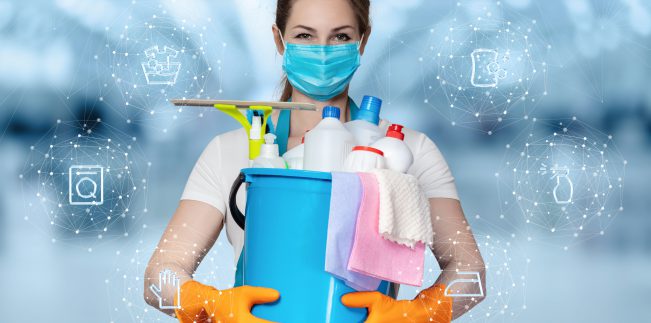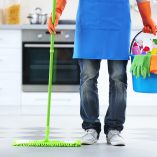Green Clean: Learn the List of Substances That Can Be Toxic While Cleaning
31 May 2022
Harmful cleaning products are the real bane of our times. Toxic liquids, poisonous detergents that we use every day for cleaning have a destructive impact not only on our health but also on other household members, including children and pets. Not to mention the disastrous effect these chemicals have on the environment where they ultimately end up, and on all living organisms. In a nutshell: there’s an annihilation in the name of cleanliness.
Toxic ignorance
Many of us don’t even realize how damaging it can be to use chemical cleaning products can be daily, and what danger some agents pose not only to the skin, but also to mucous membranes, eyes and the entire respiratory system. The truth of the matter is that ignorance, habit, convenience and easy access to popular cleaning chemicals are undoubtedly destructive, but we are not condemned to this chemical madness. It is worth to get to know the toxic “enemy”, learn the list of the most common harmful substances and simply start avoiding them. We do not have to poison ourselves, our loved ones and the environment in the name of a clean house! There are many alternatives that will help you achieve impeccable cleanliness at home while maintaining good health, safety and respect for the environment.
Chemical poker: cleaned and defeated
The market is full of household cleaning products full of strong chemicals designed to quickly and efficiently clear even the most dirty, greasy or rusty surfaces. One spray of the product and the stains should disappear, everything should shine and smell beautifully – this is what we want. Manufacturers fulfill our dreams of impeccable cleanliness and easy tidying, but at the same time give us a set of poisonous substances damaging our health. Are these compounds secretly smuggled into the products we buy? No! We just don’t read the labels, and even if we do, we don’t know the substance names or what they mean. So, it’s time to get to know the main enemies and remember the toxic list once and for all.
SLS and SLES – found primarily in washing-up liquids, liquid soaps, laundry detergents and bleaching agents. SLS is a substance that can cause allergy, itching, dryness and irritation of the skin and eyes. SLS can also cause erythema and lead to atopic dermatitis. SLES is considered slightly less aggressive, but also has similar skin irritating properties.
EDTA – this compound can be found in washing powders, fabric softeners and cleaning chemicals. It is a stabilizer that prevents changes in appearance, smell and consistency of the products. It may cause irritation of the skin, eyes and mucous membranes. In combination with nitrogen compounds EDTA forms nitrosamines which are carcinogenic.
PHOSPHATE – found primarily in washing-up liquids and laundry powders and liquids. Contact with phosphates can lead to headaches, sore throat and may cause coughing. Phosphates are also particularly harmful to underwater ecosystems.
CHLORINE – the main ingredient in toilet cleaners and bleach. It is a compound with a strong irritating effect on the respiratory tract. It can also cause skin and eye irritation. Chlorine can cause a sore throat, difficulty in breathing and even lead to lung disease in prolonged exposure.
FORMALDEHYDE – found in air fresheners, furniture and floor cleaners. It is an irritant to mucous membranes. Studies have also linked it to an increased risk of cancers, mainly of throat and nose.
PHTHALATES – found in most cleaning products, including glass cleaners and laundry detergents, as well as fabric softeners. Phthalates have been linked to endocrine disorders in men and women and impaired fertility. These substances are also highly toxic to aquatic organisms.
AMMONIA – used in pipe drainage products, kitchen and bathroom cleaning products, and glass cleaners. It has a characteristic, strong smell. It can irritate the skin, mucous membranes and eyes. Of course, the higher the concentration, the more dangerous it is. Therefore, a prolonged stay in rooms where it has been used in high concentrations is not advisable because it can lead to respiratory problems and liver and kidney damage.
CSA – found in fabric softeners, bathroom cleaners, wood cleaners, all-purpose cleaners and surface degreasers. CSA has been shown to lead to skin irritations and allergies. It can also cause respiratory problems and may contribute to the development of asthma.
NaDCC (SDIC) – it is an ingredient in air fresheners, toilet cleaners, disinfectants and various surface cleaners. This compound can cause severe irritation to the skin, eyes and respiratory system. According to studies, higher doses of NaDCC can even lead to kidney damage. This substance, when dissolved in water, produces active chlorine gas, which is caustic to the eyes, nose and mouth.
TRICKLOSAN – found in washing-up liquids, disinfectants and antibacterial products. The toxic substance may interfere with hormones and cause irritation of skin and eyes.
SODIUM HYDROXIDE – otherwise known as caustic soda, is a component of bathroom, kitchen, toilet and pipe cleaners. It can cause ulcers of the nasal passages, burns of skin, eye and even of the respiratory system.
ALUMINUM POWDER AND TRISODIUM SALT – may be found in bathroom cleaners, scouring powders and laundry detergents. The International Agency for Research on Cancer has identified these substances as contributing the development of cancer.
Obviously, these are not all the substances you should be wary of in cleaning products or cosmetics. The list is long and includes parabens, optical brighteners, NTA, PEG, petrochemicals, tar dyes, sulphates, sodium benzoate and many others. So, is it possible to find a reasonable solution that would allow you to simply clean your home without endangering your health, without causing damage to the environment, and still to enjoy a safe and pleasantly clean space?
Safe alternatives exist
The need for change and the growing awareness of the harmful, adverse effects of the daily-used detergents have resulted in wider availability of alternatives on the market. These are, for example, products for cleaning and home care containing surfactant composites of plant origin. These mainly include eco-friendly cleaners made from 100% organic ingredients. Products of this kind do not contain fragrances, so they are odorless, they are hypoallergenic, which means that they do not cause allergies and do not irritate the eyes and skin. “Eco-friendly and vegan cleaners were created out of the need to care for the health and safety of their users and out of concern for the environment. When I say users, I don’t just mean the people who do the cleaning, but all household members, especially children and pets. These products often have a composition so neutral for living organisms that even their accidental ingestion does not pose a direct threat to health and life. But obviously it should be clearly emphasized here that despite this, it is absolutely not recommended to consume them. It is also extremely important that such agents are completely biodegradable, that is, fully safe for the environment. Additionally, some of them have innovative packaging which can be safely used in upcycling”, says Agnieszka Tkaczyńska of ZAA-ZOO-LAA, a manufacturer of eco-friendly and vegan cleaning products.
Cleaning agents containing plant-based surfactants are just as efficient and effective as traditional household chemicals. With their help, even heavily soiled surfaces can be cleaned in a natural way and without unnecessary scrubbing. They are especially recommended for people suffering from allergies or asthma, people with sensitive skin prone to irritation and all those who care about the fate of our planet.
Chemically endangered environment: the choice is ours
There are many potentially harmful substances in cleaning chemicals and their use threatens the environment. Take phosphates for example. They are used, among others, in washing-up liquids. Although they are now strictly limited to a mere 0.5 percent of a product’s content, when their concentration in water is high, they can cause algal blooms in rivers, contributing to lower oxygen levels in the water and as a consequence, to the death of fish… This is just one example of the negative impact of household chemicals on the environment, but there are many more. It is a truism to say that it is good to take care of the planet in the face of climate change and the ongoing degradation of the natural environment. Respect and care for the environment is a must. Many people segregate their waste and use reusable bags. Dozens of companies are giving up plastic packaging. The next step is to use cleaning products that contain only organic and environmentally safe substances. “Let’s be environmentally friendly. Let’s remember that it’s not only our and our loved ones’ health that depends on it, but the future of the planet as well,” reminds Agnieszka Tkaczyńska of ZAA-ZOO-LAA.
More about eco-friendly cleaning at zaazoolaa.com


Leave a comment